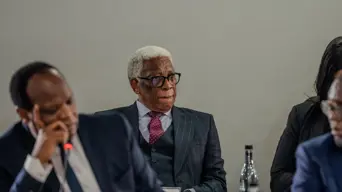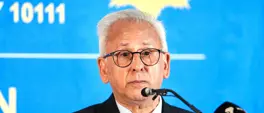Mbenenge tribunal: Sikhakhane argues cultural, linguistic nuances important in analysis of person's actions
Zoleka Qodashe
1 July 2025 | 13:52Advocate Sikhakhane made the assertion before the Judicial Conduct Tribunal on Tuesday, where he continued his cross-examination of expert witness, Lisa Vetten.

Eastern Cape Judge President Selby Mbenenge (centre) listens to testimony during the Judicial Conduct Tribunal's inquiry into sexual harassment allegations against him in Sandton, Johannesburg on 1 July 2025. Picture: Sphamandla Dlamini/EWN
JOHANNESBURG - Advocate Muzi Sikhakhane has argued that cultural and linguistic nuances are important in the analysis of the appropriateness of a person’s actions.
Sikhakhane made the assertion before the Judicial Conduct Tribunal sitting in Sandton, where he continued his cross-examination of expert witness, Lisa Vetten.
The senior counsel submitted that the evidence provided by the research associate at Wits University was deficient as Vetten did not possess the cultural background to adequately interpret the interactions between Eastern Cape Judge President Selby Mbenenge and high court secretary, Andiswa Mengo.
Mengo, who accuses the judge president of making unwanted sexual advances towards her between 2021 and 2022, had several exchanges with the top judge on the social media platform, WhatsApp, in their language, isiXhosa.
Vetten testified that Mbenenge, on several occasions, insisted that Mengo send him her pictures despite her reluctance to engage with him.
Sikhakhane said that in some cultures, courting meant persistence.
"The word ‘uk’qasa.’ Are you familiar with the Zulu word ‘uk’shela’?"
To which Vetten answered: "I’ve heard it."
"Are you familiar with the word ‘uk’phemisa’? Would you differ with me when I say those three words emerging from those particular cultures, in them, they connote and involve persistence, pleading?" asked Sikhakhane.
He added that this was an aspect that was missing in Vetten’s analysis.
"When you are not aware of particular cultural notions, you can miss in language a discussion between two people of a particular culture if your interpretation comes one from a position of ignorance or you come from a position of what you would call a superior culture. A culture that assumes that its understanding of things must be universal."
ALSO READ:
Get the whole picture 💡
Take a look at the topic timeline for all related articles.
Trending News
More in Local

30 November 2025 06:47
Hawks arrest woman recruiter and four others over luring South Africans to Russia-Ukraine war

30 November 2025 06:24
Transport Department to ensure balanced representation at the International Maritime Organisation

30 November 2025 06:00
Water & Sanitation issues warning as 10 Vaal Dam sluice gates open










